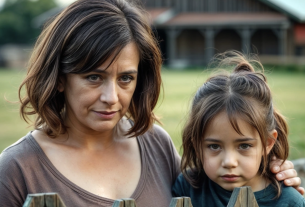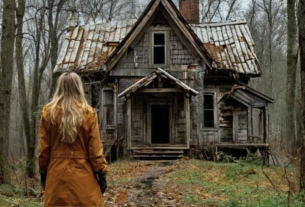“Igor, forgive me, please, if I’m interrupting,” Tatyana Yevgenyevna’s voice was quiet, almost apologetic, as if she were asking not for a favor but for some great, unthinkable indulgence. She stood in the kitchen doorway, her dry, pigment-spotted hands clasped in front of her. “The door to my room… it creaks terribly. I got up at night to drink some water and nearly jumped from the sound. Could you oil it when you have time? If it’s not too much trouble, of course.”
Igor didn’t even look up from his phone. He was sprawled on the sofa in the living room, which was combined with the kitchen, lazily scrolling a news feed with his thumb. In answer to his mother-in-law’s request he produced an indistinct throaty sound—something between “uh-huh” and “leave me alone.” It was enough for Tatyana Yevgenyevna to know she’d been heard; she immediately retreated to her room, pulling shut that very door. A long, drawn-out, groaning squeal came from the hinges.
Yulia, who was wiping down the counter just then, tensed. She felt the atmosphere in the apartment—never very welcoming to begin with—grow denser, as if some of the air had been pumped out. All week that her mother had been visiting, Igor had worn the face of a man with a jackhammer running nonstop under his window. He didn’t throw open fights, no. He radiated waves of silent, sticky displeasure. Everything irritated him: the soft rustle of the newspaper her mother read in the evenings, the faint whiff of corvalol in the hallway, even how long, in his opinion, she occupied the bathroom in the mornings. He kept quiet, but that silence was louder than any shout.
He set the phone down on the sofa with a sound like dropping a stone.
“Your old hag is going to tell me what to do in this house now,” he said quietly, but with such distinct bile that Yulia flinched. He stared at the wall in front of him as if addressing an invisible companion who would surely understand and back him up.
“She just asked, Igor,” Yulia tried to keep her voice as calm as possible. She put down the cloth and turned to him. “The door really does creak so badly it wakes you at night. I meant to ask you myself—I just forgot.”
“She just asked,” he mimicked, twisting his lips into an unpleasant smirk. “Of course. She’s got everything laid out here for her, like it’s a spa. She showed up, sprawled out, now she’s laying down the rules. Oil the door, then what? Turn the TV down when she deigns to rest? Tiptoe around?”
It was unfair and petty. Tatyana Yevgenyevna behaved quiet as a mouse. She left her room only to eat or go to the clinic. Most of the time she sat in there so as not to, God forbid, disturb “the young.” She was afraid of being a burden—you could feel it in every movement, every soft word.
“Please stop. She came for a week, for tests. It’s not forever,” Yulia came over to the sofa, still hoping to steer things back to peace. “She already feels bad that she’s in our way.”
“In our way?” He finally turned his head, and in his eyes she saw a cold, ingrained irritation. “It’s me she’s cramping! I can’t relax in my own home! I’m always having to think someone’s behind the wall listening, expecting something. Always that smell of medicine. Always that disapproving face. Nothing suits her.”
He stood up, walked into the kitchen, opened the fridge, stared into it aimlessly, and slammed the door shut.
“Exactly. A whole week of this show. And let that door keep creaking. Maybe then she’ll come out of her den less often.”
With that he grabbed his headphones from the shelf, deliberately put them on, and collapsed back onto the sofa, disappearing into his phone. It was worse than a fight. It was an ultimatum disguised as total indifference. Yulia was left standing in the middle of the kitchen, alone. From the hallway came the quiet, plaintive creak again—her mother was going to the bathroom. That sound grated on her worse than any insult.
Evening thickened into something like dense, inky jelly. Dinner passed in near silence, broken only by the delicate clink of forks on plates. Tatyana Yevgenyevna ate her portion of buckwheat and a chicken cutlet with guilty speed, thanked them, and almost ran back to her room. The piercing creak of the door sounded this time like the final chord of a funeral march. Yulia and Igor were left alone at the table. He finished his food, chewing with exaggerated appetite, ostentatiously showing that nothing bothered him. She simply picked at her cooling cutlet.
“Igor, we need to talk,” Yulia began, putting down her fork. Her voice was even, almost pleading. She decided on one last attempt to appeal to his reason.
“About what?” He didn’t look up. “I think I made everything perfectly clear this afternoon. My position hasn’t changed.”
“Your position?” She barely held back a bitter smile. “Your position is to torment an elderly person with silence and passive aggression—someone who came into a strange home out of necessity? That’s not a position, Igor. That’s pettiness.”
He dropped his fork onto the plate. The clatter was loud and ugly.
“Pettiness? Pettiness is dragging her here for a whole week and pretending nothing’s happening! She walks around with that face like we owe her for life. Always sighing, always dissatisfied. Today it’s the door; tomorrow she’ll decide I’m breathing too loudly. This will never end!”
“She hasn’t said a word to you! She’s afraid to step out of the room!”
“Exactly! She does everything silently! That’s worse! She looks at me like I’m a piece of trash getting in her darling’s way! That’s her signature move—I can smell it a mile off. Always suffering, always the victim so everyone around feels guilty. My mother’s the same. One for one. Always dissatisfied, always reproaching with just a look. And you know what, Yulia? The apple doesn’t fall far from the tree…”
He didn’t finish. Yulia rose slowly from the table. Something in her face changed so sharply and completely that Igor instinctively fell silent mid-sentence. The warmth left her eyes, leaving two dark, unreadable wells. The calm she had so carefully maintained crumbled to dust, and in its place appeared something cold, sharp, and very dangerous.
“What did you say?” she asked, a whisper more frightening than any scream.
Not yet grasping the scale of the change, Igor smirked, though a clammy chill stirred deep inside. He decided he’d broken through her defenses and should strike while the iron was hot.
“Exactly what I said. You’re becoming her exact copy. The same constant dissatisfaction, disguised as—”
He didn’t finish again. She took one step, moved around the table, and stood right in front of him. Close enough that he could see a tiny scar on her eyebrow. Her face looked like a mask carved from pale marble.
“Go badmouth your mommy all you like, but if you say even one more word about my mother that I don’t like—you’re out of my apartment on the spot. I won’t stand on ceremony with you, darling.”
She leaned even closer, her eyes drilling into his.
“You live here. In MY apartment. You eat the food I cook. You sleep in the bed I bought. You enjoy my hospitality. Up till now I considered you my husband. Right now you’re just a lodger. A lodger who’s forgotten his place. So let me remind you. One more crooked word—one sidelong glance—toward my mother, and your things will be in the stairwell. Do you understand me?”
Igor stared at her, unable to utter a word. His brain refused to process it. The woman who five minutes ago had begged him for peace was gone. In her place stood a stranger—a merciless person who had just, with absolute calm, announced the terms of his continued existence. Instinctively he shrank back until his spine hit the wall. The power in this home had just changed. Finally and irrevocably.
Igor didn’t answer. He couldn’t have, even if he’d wanted to. The words thrown in his face were not just a threat—they were a statement of fact, a cold, final sentence. All his swagger, all his feigned head-of-household pomp fell away like cheap gilding, leaving behind a bewildered, humiliated man. He looked at Yulia, and there was nothing in her eyes to latch onto: no anger, no hurt, not even hatred. Only emptiness. The efficient, icy emptiness of someone who has just erased you from her life and is now dealing with the technicalities of your continued presence. Slowly, like an old man, he edged away from her and sank back onto the chair he had just leapt from.
Without granting him another glance, Yulia turned away. She returned to the table, silently picked up his plate and hers, and carried them to the sink. Her movements were precise and economical, as if performing a long-learned task. She turned on the tap. Hot water hissed over the dirty dishes. She took a sponge, squeezed a drop of detergent onto it, and began to wash the plates in steady circles. The squeak of the sponge on ceramic, the rush of water—these ordinary household sounds became deafening in the new silence. They were a declaration. A declaration that the incident was over. The conversation was finished. Life—her life—would continue on her terms.
Igor sat motionless, staring at his wife’s back. He felt gutted. His entire sense of himself—as a man, as head of the family—had been crushed and ground into the kitchen linoleum. He had always thought of this apartment as his. Yes, it had come to Yulia from her grandmother, but he lived here, slept in this bed—he was her husband, after all. Turns out that was an illusion. He wasn’t a husband; he was a guest. A guest whose right to stay had just been called into question.
Yulia washed the dishes, set them neatly in the rack, and dried her hands. Then she walked past him without a glance and went into the bedroom. A couple of minutes later she came out with a blanket and a pillow and dropped them silently on the living-room sofa. It wasn’t done in malice or provocation. It was like tossing down a mat for a dog, assigning it a place for the night. Then she just as silently returned to the bedroom and closed the door behind her. The click of the lock sounded like a gunshot in the apartment’s hush.
The night was long. Igor didn’t sleep. He lay on the sofa—which suddenly felt foreign and uncomfortable—and stared at the ceiling. Humiliation burned in him with a cold fire, refusing to let him drift off for even a second. He replayed her words, her look, her calm, cruel actions. The more he thought, the more a dark, impotent rage boiled inside him.
Morning brought no relief. It brought a new reality, woven of silence and demonstrative disregard. Yulia came out of the bedroom already dressed, ready to go. She went to the kitchen, put the kettle on, took yogurt and cottage cheese from the fridge. She moved through her territory with confidence and ease. Igor got up from the sofa feeling rumpled and sore. He went to the kitchen too, hoping for a cup of coffee, some return to a semblance of normal.
Yulia poured boiling water into two cups. In one she put a chamomile tea bag; into the other she spooned sugar. Then she took both cups and, without a word, carried them into her mother’s room. The door closed behind her, this time without a creak—apparently she held it from inside so as not to disturb the apartment’s peace. Igor was left standing at the empty table. There was no coffee for him. He wasn’t part of this morning. He was furniture. A piece of the decor.
Ten minutes later Yulia came out with her mother. Tatyana Yevgenyevna was pale and looked as if she hadn’t slept all night. She didn’t look toward Igor; her eyes were fixed on the floor.
“Mom, are you ready? We should be leaving for the clinic soon,” Yulia’s voice was even, drained of any color. She spoke to her mother as if Igor didn’t exist in the room.
They dressed in the hallway. Yulia helped her mother fasten her coat and straighten the scarf at her neck. That scene of quiet, tender care was another punch to Igor’s gut. It was a demonstration. This is whom she loves. This is who matters. And you are nothing. When the front door shut behind them, Igor was left alone in a deafeningly quiet apartment. He walked slowly into the kitchen and looked at the door to his mother-in-law’s room. The door where it had all begun. Something misshapen and vicious stirred in his soul, promising this was far from over.
They came back close to noon, tired and silent. Igor heard the key turn in the lock and tensed all over on the sofa. He had spent the entire day in that quiet apartment, which had turned into a torture chamber for him. Every piece of furniture seemed to mock him, to remind him of his degraded position. He hadn’t turned on the TV or listened to music. He simply sat there nursing his rage, stoking it to a white heat. He waited. He didn’t know for what exactly, but he felt an explosion was inevitable.
Yulia and Tatyana Yevgenyevna came in carrying with them the faint, sterile smell of the clinic. Yulia went straight to the kitchen to set down her bag, and her mother, slowly, with a certain elderly caution, took off her coat in the hallway. She saw Igor, and fear flashed across her face. She quickly looked away and tried to slip into her room.
“Mom, let’s have lunch—I’ll heat it up quickly,” Yulia called matter-of-factly from the kitchen. She still acted as if Igor didn’t exist.
Lunch, like the previous night’s dinner, passed in oppressive silence. Yulia set bowls of soup on the table. For herself, for her mother. And, after a second’s hesitation, for Igor. It wasn’t a gesture of reconciliation. It was mechanical, as if she were feeding a cat. Igor ate without a word, feeling the food stick in his throat. He watched his mother-in-law. She ate with her head down, trying to be as inconspicuous as possible, and that submissive, beaten posture infuriated him even more.
When the soup was finished, Tatyana Yevgenyevna got up and went to the kettle. She brewed tea in her cup and then, mustering her courage, took another cup, dropped a sachet of some herbs into it, and poured in boiling water. She came to the table and, her hand trembling with nerves, set the cup in front of Igor.
“This… this is for the nerves, Igor. A calming blend,” she whispered, not daring to raise her eyes. “Drink some—you must be having a hard time…”
That was the last straw. Her pity. Her attempt at care, which he took as the height of hypocrisy and mockery. A sick, feeble old woman was pitying him. Teaching him how to live. Igor slowly raised his head. His face twisted into an ugly, spiteful grin.
“Hard? It’s hard for me?” he said quietly, but with such icy hatred that Tatyana Yevgenyevna recoiled. “Yes, it’s hard for me. It’s hard to breathe the same air as you, you old hag. You came here to die, didn’t you? Came for tests to find out how much longer you’ve got to foul this sky and poison other people’s lives?”
Yulia froze with a plate in her hands. But she stayed silent. She let him finish.
“A calming blend?” He pushed the cup away in disgust. “You’d better brew it for yourself. A double dose. To be sure. So you won’t creak your bones anymore and won’t ask me to oil your hinges. You think you’re a guest here? You’re not a guest. You’re mold. A burden. That your darling daughter dragged into MY house so I’d have to bow and scrape to you!”
He stood, looming over the table, and addressed the petrified, terrified woman directly.
“You were nothing your whole life, and you’ll die a nobody. A pitiful, sick old woman who’s nothing but trouble to everyone. And the sooner that happens, the better for everybody. Especially for your daughter, who has to drag you around hospitals instead of living a normal life.”
He was done. Dead silence fell in the kitchen. He was breathing hard, expecting screams, tears, a scene. But none of that came. Yulia slowly set the plate on the table. Her face was perfectly calm, unreadable. She looked at him the way one looks at an insect just before crushing it. Then she stood up without a word, walked past him into the hallway. Igor, grinning in triumph, waited for the next act.
She didn’t go to the bedroom. She went to the front door, turned the key, and flung it wide. Then she came back to the kitchen doorway and looked at Igor.
“Out,” she said. Her voice was quiet, but left no room for argument.
Igor was taken aback.
“What?”
“I said out. Right now. In what you’re wearing.”
His face went slack. He couldn’t believe it. This wasn’t a bluff.
“Are you… are you serious? You’re throwing me out?”
“I warned you,” she answered in that same even tone. “One more word about my mother, and you’d be out. You said your word. Now it’s your move. The door is open.”
She stood and waited. Without moving. Her calm was more frightening than any fury. Igor looked around the kitchen—his plate, his mother-in-law frozen in shock, Yulia standing in the doorway like a guard. He saw nothing in her eyes. No chance, no regret, no possibility of setting anything right. Only emptiness. He understood he had lost. Completely. Slowly, as if in a dream, he stood up, walked around the table, and headed for the door. He passed her, feeling her cold, watchful gaze on him. He stepped over the threshold.
“I’ll be back, and you’ll both regret this!”
Without another word, Yulia closed the door behind him. One lock clicked. Then a second. She turned and looked at her mother, who sat with her face in her hands. Then she immediately took out her phone and called a locksmith to change both front-door locks first thing in the morning. The apartment fell silent. But it was a different kind of silence now. The silence of scorched earth.



